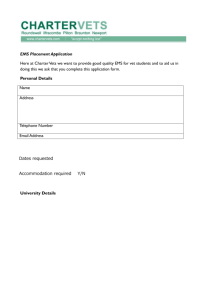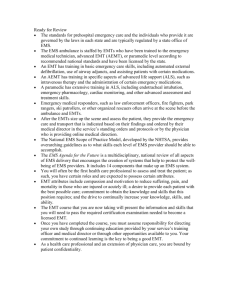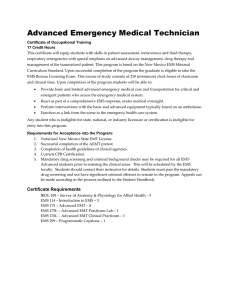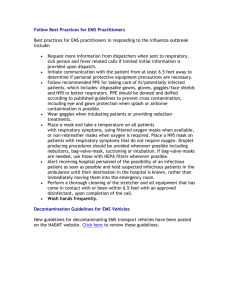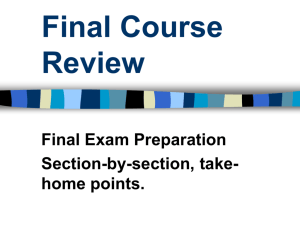Emergency Medical Services EMT
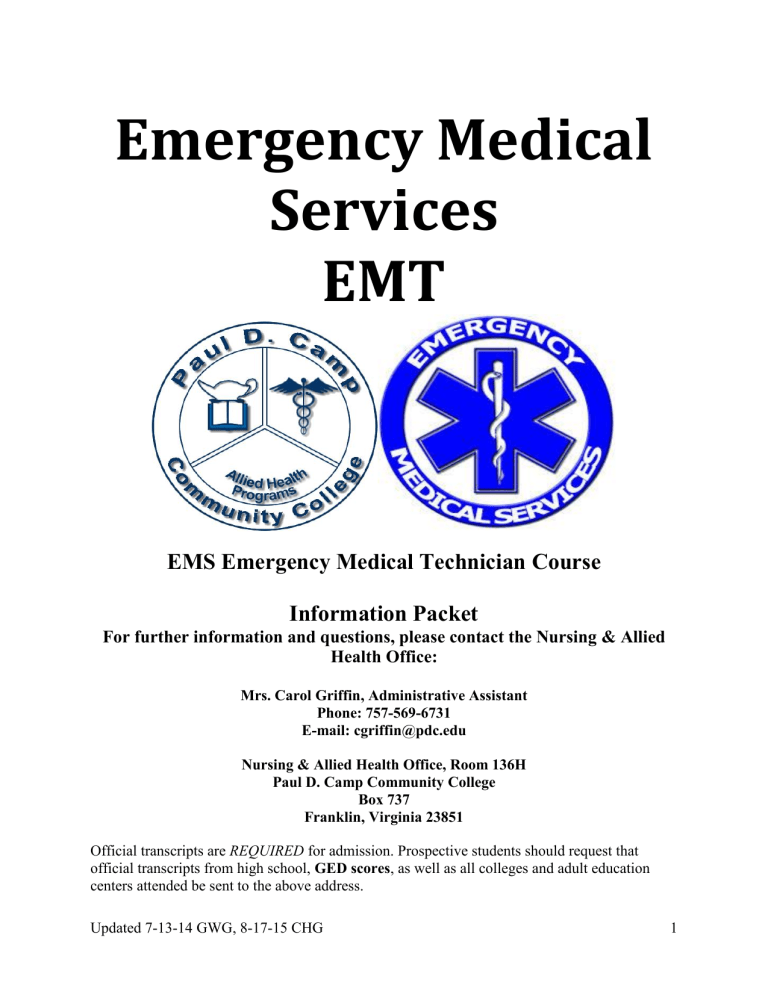
Emergency Medical
Services
EMT
EMS Emergency Medical Technician Course
Information Packet
For further information and questions, please contact the Nursing & Allied
Health Office:
Mrs. Carol Griffin, Administrative Assistant
Phone: 757-569-6731
E-mail: cgriffin@pdc.edu
Nursing & Allied Health Office, Room 136H
Paul D. Camp Community College
Box 737
Franklin, Virginia 23851
Official transcripts are REQUIRED for admission. Prospective students should request that official transcripts from high school, GED scores , as well as all colleges and adult education centers attended be sent to the above address.
Updated 7-13-14 GWG, 8-17-15 CHG 1
The EMS Emergency Medical Technician Course
Degree : EMS Emergency Medical Technician Course
Length of Program : 1 Semester
The concept of our EMS EMT Course and clinical is to provide an opportunity for those interested in an EMS career to acquire the knowledge, skills and experience of the scope of practice of the EMS Virginia EMT technician.
Upon completion of the program, graduates have met the educational requirements necessary to be eligible to take the Virginia EMT exam and obtain Virginia Certification as an Emergency Medical Technician.
Steps for Applying to the EMS Emergency Medical Technician Program
Note: Application to the EMS EMT Program requires a separate and additional process beyond being admitted to the College. The necessary EMS EMT program application forms are included at the end of this packet.
1.
Submit an application to Paul D. Camp Community College [PDCCC] (New students and those who have not enrolled within the past three years must submit an application.)
2.
Submit an application to the PDCCC EMS EMT Program. The form is included at the end of this packet. Submit the EMS EMT Program application to:
The Nursing & Allied Health Office, Room 136H
Paul D. Camp Community College
Box 737, 100 North College Drive
Franklin, Virginia 23851
3.
Arrange for ONE (1) OFFICIAL COPY OF EACH of the following to be sent to the
Nursing & Allied Health Office. Use the address above.
1.
High school transcript or GED certification scores
2.
Any Health care Program/School transcript and license/Certifications
3.
Transcripts from all colleges (other than PDCCC) or adult education centers attended
4.
College Placement Assessment Tests if you have not done so already. If it has been several years, repeat the tests to update your profile. If you have already taken through
Math 05 (algebra), you do not have to take the math placement test. If you have already taken English 111 (English Composition) at PDCCC or another college, you do not need to take the Writing Test. All students must take the reading placement test regardless of documented college courses.
To schedule an appointment to take the placement tests , call the admissions office in
Franklin (569-6707 or 6722), Suffolk (925-6312 or 6313), or Smithfield (925-6340) or go to any of the admissions offices. Take your copy of the placement test results to the nursing office to be placed in your files and for advising as necessary.
Updated 7-13-14 GWG, 8-17-15 CHG 2
5.
Consult one of the Financial Aid Offices if you intend to apply for financial aid or scholarships. Call Toll Free: 1-855-877-3918 or email: FinancialAid@pdc.edu.
Arrange to meet with the EMT Education Coordinator or an Allied Health advisor (569-6731) to make a plan for the courses you will take each semester . YOU MUST FIRST TAKE THE
DEVELOPMENTAL COURSES RECOMMENDED BY PLACEMENT TEST SCORES.
You need to take math courses through Math 05, but not beyond.
6.
Take pre-requisites courses that are not already on your high school or college transcript.
You must have: i.
Virginia Office of EMS Approved Cardio Pulmonary Resuscitation
Course (CPR) ii.
Math 05 or math placement test scores that does not recommend taking through Math 05. iii.
Any other developmental courses recommended by the placement tests
(writing and reading test results).
7.
Maintain a cumulative and curricular GPA of 2.5 or better in the general education courses in the EMS curriculum (See page 5). If you have not taken courses in the EMS curriculum, the GPA from your most recent education experience will be used . The grades on EMS Intermediate program required general education courses taken at other institutions will be used in the calculation of your curricular GPA.
8.
Submit all transcripts, and application materials well in advance of June 19. Check by email (cgriffin@pdc.edu) or phone (757-569-6731) to be sure all paperwork has arrived.
9.
Evidence of U.S. Citizenship or authorization to reside in the United States.
If you have all of these prerequisites and have taken all developmental courses recommended by placement testing, you have met the MINIMUM QUALIFICATIONS for the EMS EMT Program and your application will be included in the next round of applications reviewed IF all paperwork for the application process (including all placement testing, transcripts, recommendations, etc.) is received in the Nursing & Allied Health
Office by June 19 prior to the August in which you hope to begin the program.
Admission Criteria
Once all required paperwork is submitted to the Nursing & Allied Health Office and you have completed all pre-requisite classes, each student will be considered for admission using some or all the following methods: a.
Academic achievement as shown by cumulative and curricular GPA* or most recent GPA if no current curricular GPA has been established. Candidates, who have taken any general education courses required for the degree and receive a grade of “D” or less, must repeat the course and successfully pass with a C or better before being granted final admission to the program.
Updated 7-13-14 GWG, 8-17-15 CHG 3
b.
Grades of “C-” and below are not transferable into the nursing and allied health programs. c.
Evaluation of recommendations required by the application process. d.
Number of courses taken at PDCCC
Priority will be given to students who attend PDCCC and reside in its service area. Applicants from other parts of Virginia and applicants from other states will be considered only after service region students are considered.
Enrollment Details
Qualified applicants will be advised by letter from the Nursing & Allied Health Office of additional preadmission procedures inclusive of but not limited to: a.
Completion of the preadmission physical examination inclusive of laboratory testing and required immunizations. (Required every two years) b.
Preadmission mandatory orientation session. c.
Ordering uniforms, and skills lab bag. d.
Proof of CPR certification as “Health Care Professional” through an approved
Office of EMS CPR Program e.
Official State Police Criminal Records (Criminal History Request and Sex
Offender Crimes against Minors) Background checks and drug testing are required by clinical facilities. An independent agency will conduct these checks and they must be completed prior to the start of nursing and allied health classes.
Once enrolled in EMS courses, students must comply with the rules and regulations as outlined in the College Catalog and EMS Student Handbook. Students must minimally maintain: a.
Current CPR certification in “Health Care Professional” status through an approved Office of
EMS CPR Program. b.
At least 2.5 curricular GPA c.
Satisfactory clinical performance d.
Satisfactory physical and mental health e.
Documentation of certain immunizations to include yearly Tb test or chest x-ray. f.
Professional demeanor and attendance (as measured by tests and instructors’ observations).
Attendance standards for both class and clinical experience must be met. Students must pass each curricular EMS course to proceed to the next. Students must pass tests on dosage calculations and clinical skills, and must demonstrate clinical competence in EMS courses with clinical components.
Any student who receives a final grade lower than “C” in any of the courses required for the
EMS EMT Course will not be permitted to continue in the EMS EMT Course until the grade is a
“C” or better. In order to resume, students must write a letter to the EMS Program Coordinator to request re-admission.
Updated 7-13-14 GWG, 8-17-15 CHG 4
Students are responsible for additional fees charged for:
Official State Police Criminal Records background checks (Criminal History Request and
Sex Offender Crimes against Minors) and urine drug testing are student expenses (~$110.00 payable through Certified Backgrounds).
*Curricular GPA is calculated by only using the information from courses in the EMS curriculum. Add up the number of hours of the classes you have taken. The number of hours of the class is the number stated in registration information (for example ENG 111 has 3 hours and
BIO 141 has 4 hours). Add up the number of credits you have obtained from each of the curricular classes. Credits are determined by the grades you get on each course. For A - 4 credits per hour; for B - 3 credits per hour; for C –2 credits per hour; for D - 1 credit per hour; for F - 0 credits per hour). For example, BIO 141 has 4 hours. If you get a B on BIO 141, you multiply the number of hours (4) by the credits per hour (3): 4 hours multiplied by 3 credits per hour equals
12 credits. Divide the total credits from all curricular classes by the total number of hours for all curricular classes.
Ex. ENG 111 with a C is 3 hours and 6 credits (3 x 2 for a C)
B IO 141 with a B is 4 hours and 12 credits (4 x 3 for a B)
PSY 201 with an A is 3 hours and 12 credits (3 x 4 for an A)
The curricular GPA with these classes would be 30 credits divided by 10 hours = 3.000
EMS Emergency Medical Technician CURRICULUM
Program Requirements: To complete the EMT Course the student must complete the courses listed below. Note: This curriculum is subject to minor changes. Please consult the
Nursing & Allied Health Office from time to time for updates.
COURSE REQUIREMENTS (8 CREDITS)
EMS 111
EMS 120
EMT-Emergency Medical Technician
EMT Clinical
(7)
(1)
EMT 109 CPR for Healthcare Providers (1)
Minimum Credits Required: 9
SEQUENCE OF CLASSES
EMS 111
EMS 120
EMT 109
Semester 1 (Fall)
Emergency Medical Technician - Basic
EMT-Basic Clinical
CPR for Healthcare Providers
Minimum Credits Required:
7
1
1
9
Updated 7-13-14 GWG, 8-17-15 CHG 5
APPROXIMATE COSTS FOR STUDENTS IN THE EMT BASIC PROGRAM
Tuition & Fees
Medical Examination (varies with practitioner)
Books (approximate)
In State
Out-Of-State
EMS program
Uniforms (EMS Pants, Black shoes, photo ID Badge, polo, etc.)
Virginia EMT Exam
FISDAP Clinical and Testing
CPR Certification
Criminal History & Sex Offender Background & Drug Screening Checks
In-State residents
Approximate Totals out-of-state
FINANCIAL AID and SCHOLARSHIPS: Consult one of the Financial Aid Offices if you intend to apply for financial aid or scholarships. Call Toll Free: 1-855-877-3918 or email:
FinancialAid@pdc.edu
.
$1301.85
$3053.25
~$600.00
~$150.00
~$150.00
$100.00
$120.00
$100.00
$110.00
$2,631.85
$4,383.25
Updated 7-13-14 GWG, 8-17-15 CHG 6
Frequently Asked Questions (FAQs)
1.
Is this program affiliated with Tidewater Community College? No, all students are
PDCCC graduates.
2.
Can any student enroll in the EMS Emergency Medical Technician classes (classes listed in the schedule with the EMS prefix)? No, each student is required to go through a separate application process to be admitted specifically to the EMS EMT Program before he/she can begin to take EMS classes. Only accepted students can register for
EMS classes.
3.
What courses should I take in high school? Focus on algebra and biology. You will need to make at least a C+ in these courses.
4.
What does your grade point average have to be to get into the program? A curricular and cumulative GPA of 2.5 or better on a 4.0 college grading scale.
5.
What do I need to do to be admitted to the program? C arefully review and follow the steps described on the second and third pages of this packet.
6.
Are there any scholarships or other funds available to help me with school related expenses? Yes, the college has state and federal financial aid programs as well as several scholarship programs. Some hospitals have scholarship programs and forgivable loans.
You can discuss your needs with the college’s financial aid office. Consult one of the
Financial Aid Offices if you intend to apply for financial aid or scholarships. Call Toll
Free: 1-855-877-3918 or email: FinancialAid@pdc.edu
.
7.
How long will it take me to get through the program? If you have all the high school requirements and do not need any developmental courses based upon placement tests, and have had or tested out of computer competencies, it is possible to complete the program in 1 semester. However, there is competition for the slots available and not all students get in on first attempt that would delay program completion by at least one year.
8.
What degree is awarded?
The College awards a Career Studies Certificate in EMS
Emergency Medical Technician. Upon successful completion of the program students are eligible to take the Virginia EMT Exam and gain certification as a Virginia EMT
Technician.
Updated 7-13-14 GWG, 8-17-15 CHG 7
9.
How old must I be to take the EMS Intermediate course?
According to Virginia Law you must be 16 years of age to enroll in a Basic Life Support Program.
10.
How many days a week and when will I be in school once I begin the EMS courses?
Students will attend minimally 2 days a week – alternating between lecture and clinical experience. Classes will be scheduled between 7:00 P.M. and 10:30 P.M. The schedule will alternate days during the course of month because of the instructors rotating work schedule. Such as for two weeks the class may meet on Tuesday and Thursday and the third week may be on Monday and Wednesday. On-campus Skills Labs will operate at during regular class hours. There a chance of some weekend (Saturday & Sunday)
Classes, but these are minimal and prior notice is given. There are 12 hour clinical days that students are allowed to schedule.
11.
How long are the lectures? Lectures will be 3 hours per session.
To become better prepared for the rigorous EMS EMT curriculum, you can, if your high school offers these courses, take the following (listed in order of importance):
Dual Enrollment Biology (BIO 101-102) or AP Biology
Dual Enrollment English (ENG 111 – 112) or AP English
You will receive college credit from PDCCC (or other community colleges) for the dual enrollment classes. In most high schools the tuition for these classes is an expense of the student and his/her family.
Also be aware that high school students 16 and older may enroll in regular community college courses if they have a letter recommending such from their principal.
Be aware that the semester calendars for community college courses are significantly different from high school calendars, and any student attempting to take regular college courses must adapt to the college calendar.
12.
Will I be able to work and go to school at the same time?
Yes, the EMT program will allow for a student to work and attend. Be aware that the program has a 100% completion rate and you must attend or make up all material if a class is missed.
13.
How many credits are required for the program? 9 credits. See page 5 for the list of courses.
14.
If I have a GED, can I still be accepted into the EMS program? Yes.
Updated 7-13-14 GWG, 8-17-15 CHG 8
15.
Where will my clinicals take place? The hospitals most used will be Sentara Obici in
Suffolk and Southampton Memorial Hospital in Franklin. For other specialties areas clinicals will likely be in Portsmouth, Suffolk, Zuni, Newport News, Norfolk, and
Richmond.
16.
Is there any filed clinicals?
Yes, field clinicals are required for EMS Programs.
17.
What happens if you fail a course? If you withdraw from or fail a course one time, you may request readmission and retake the course. If you withdraw from or fail the course twice, you will be unable to continue in the program or to be readmitted.
18.
How much of my life do I have to give up while in EMS EMT school? There are at least 4 hours of homework per week for EMS classes alone. This does not include library time or driving time.
19.
How much will I have to study? This depends on your learning style and will vary from student to student. A good estimate would be 6 hours per week for major EMS
EMT course areas.
20.
How many different teachers will I have? You will have a different teacher for almost all of the general education courses. In EMS EMT, you will have a varying number of
EMS lecture instructors and 4-6 clinical instructors over the course of the program.
21.
Will my teachers be certified Virginia EMT’s? Not always. The Virginia Office of
EMS requires that all instructors be a master in their field. The EMS Program requires documentation from instructors that pertains to their education. You could have a physician teach one lecture and EMS Intermediate teach another.
22.
How much does the program cost? An approximate cost subject to change is $2,631.85 for in-state, $4,383.25 for out-of-state.
The lab tests can be very expensive. See page 6.
23.
What costs are required? At a minimum you may have to purchase uniforms, work shoes, laboratory skills supplies, EMS textbooks, CPR course, standardized exams, police background checks, urine drug screening, physical examination, and laboratory screening tests.
24.
What extra money do we have to anticipate spending? In addition to the already covered expenses in the page 6 chart, some additional expenses to consider are: gas, car repair, food, pens, paper and computer supplies, and babysitter to name a few.
Updated 7-13-14 GWG, 8-17-15 CHG 9
25.
What if I have had a lot of traffic tickets ? Minor traffic offences are not a problem.
However if you have been convicted of other criminal offences you need to confidentially speak with the EMS Program Coordinator. Health care facilities require a criminal background check and urine drug screening and will not allow those with prior conviction to work in their facilities. However, this does not prevent you from attending the EMS program. The Virginia Office of EMS has a document titled Prerequisites for
EMS Training Programs, Criminal History and Standards of Conduct which must be adhered to by any student in an EMS program.
26.
Do I have to volunteer at a fire or rescue department? No. However, it will be beneficial to you to volunteer and gain field experience while attending the EMS
Intermediate program. It can’t be stressed enough how much participating with an EMS agency could benefit you throughout this program.
Updated 7-13-14 GWG, 8-17-15 CHG 10
Updated 7-13-14 GWG, 8-17-15 CHG 11

